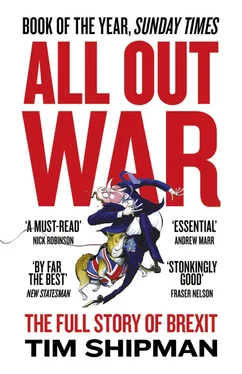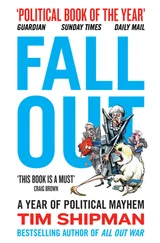Tim Shipman - All Out War - The Full Story of How Brexit Sank Britain’s Political Class
Здесь есть возможность читать онлайн «Tim Shipman - All Out War - The Full Story of How Brexit Sank Britain’s Political Class» — ознакомительный отрывок электронной книги совершенно бесплатно, а после прочтения отрывка купить полную версию. В некоторых случаях можно слушать аудио, скачать через торрент в формате fb2 и присутствует краткое содержание. Жанр: unrecognised, на английском языке. Описание произведения, (предисловие) а так же отзывы посетителей доступны на портале библиотеки ЛибКат.
- Название:All Out War: The Full Story of How Brexit Sank Britain’s Political Class
- Автор:
- Жанр:
- Год:неизвестен
- ISBN:нет данных
- Рейтинг книги:3 / 5. Голосов: 1
-
Избранное:Добавить в избранное
- Отзывы:
-
Ваша оценка:
- 60
- 1
- 2
- 3
- 4
- 5
All Out War: The Full Story of How Brexit Sank Britain’s Political Class: краткое содержание, описание и аннотация
Предлагаем к чтению аннотацию, описание, краткое содержание или предисловие (зависит от того, что написал сам автор книги «All Out War: The Full Story of How Brexit Sank Britain’s Political Class»). Если вы не нашли необходимую информацию о книге — напишите в комментариях, мы постараемся отыскать её.
All Out War: The Full Story of How Brexit Sank Britain’s Political Class — читать онлайн ознакомительный отрывок
Ниже представлен текст книги, разбитый по страницам. Система сохранения места последней прочитанной страницы, позволяет с удобством читать онлайн бесплатно книгу «All Out War: The Full Story of How Brexit Sank Britain’s Political Class», без необходимости каждый раз заново искать на чём Вы остановились. Поставьте закладку, и сможете в любой момент перейти на страницу, на которой закончили чтение.
Интервал:
Закладка:
Peering at the laptop like Downing Street’s in-house psephologist, Cameron began commentating on his own downfall. ‘He was comparing the results on Messina model,’ an aide said. ‘He’d say, “Well, that’s three points short,” or “That’s two points short.” He was incredibly calm.’ And that was the story of the evening. At each turn, Remain was falling two to four points below expectations. Cameron’s inner circle pinned their hopes on good results in Scotland and London. When they started to come in, Cameron said, ‘We could still pull this back.’
But while Remain was winning big in its heartlands, turnout was lower than required. In Leave’s strongholds, three million people who never usually voted had turned out. Gradually, and with a minimum of drama, hope began to fade. ‘There was no panic,’ one young adviser remarked, just a strange and creeping realisation that everything was going wrong, that the gamble had failed.
As Cameron sat at the laptop, others in the room thought back to the key moments that had brought them here – the rebellion of eighty-one Tory MPs over a referendum in 2011; the announcement that Cameron would offer one in the Bloomberg speech of 2013; the pledges to deal with migrant benefits; the election victory in May 2015 that made it inevitable; the renegotiations with other EU countries which fell short of his previous pledges; the decisions by Michael Gove and Boris Johnson to put their principles and their ambitions before their loyalty to Cameron; the immigration figures; the debates; the posters; the murder of the Labour MP Jo Cox – a reminder that some political lives end much more tragically than in defeat at the ballot box.
For Craig Oliver, the director of communications, the memory that stuck in the mind was of a conversation with Cameron in the back of a car after the general election, when the prime minister had weighed up the pros and cons of the decision to hold a referendum. Cameron laid out the reasons in favour: the public’s democratic right to decide, the need to placate his party, to lance the boil that had spread across British politics since the public were last asked their view on Europe in 1975. Asked for the case against, the prime minister said, ‘You could unleash demons of which ye know not.’ 1
A Cameron confidant with whom Oliver discussed the moment said, ‘I am sure he was thinking of the demons within the Tory universe, and whether they may take control and finish him off. The demons he’d been fighting hard to control all along. The demons that had played a huge role in making the Conservative Party unelectable for a generation.’
The demons were the forces of Euroscepticism that had been growing in the Conservative Party for three decades; they were the Eurosceptics who had forced Cameron to abandon his pledge to stop ‘banging on about Europe’; they were the ‘fruitcakes, loonies and closet racists’ of Ukip he had once dismissed; perhaps also they were Michael Gove and Boris Johnson, whose decision to oppose him had put the result on a knife edge. Cameron also believed in the demons of economic disaster in the event of a Leave vote, the upsurge in nativist sentiment during the campaign, even the willingness of campaigners on both sides to stretch the truth to make their point during the campaign.
Draped across Cameron’s knees, fast asleep, was his daughter Nancy. Numerous people remarked on her presence that night. Cameron was always a father as well as a politician. However hard he worked – and he worked much harder than his critics liked to pretend – he had always found time to go up to the flat and see the children. His ability to compartmentalise may have led people to label him a ‘chillaxer’, but it also meant that he was that rare species of prime minister not driven slightly mad in office.
Those searching for meaning and significance in the night’s events might have looked down at the table they were sitting around, a beautiful circular piece of elm that was commissioned for the G8 summit in Lough Erne in 2013, a time when Cameron was top dog, playing host to Barack Obama, Angela Merkel and the rest. If he had paused to think of the German leader, did he thank her for the help she had proffered in securing a renegotiation of Britain’s relationship with Brussels, or did he think – as several of those present that night did – that he had never asked her for enough, never put her on the spot, never forced her to choose between Britain’s place in Europe and her precious free movement of people?
They might have considered the room they were in, the Thatcher Room, named after the prime minister who fell because her growing scepticism had offended the pro-Brussels establishment within her own cabinet. Cameron was on his way out because he had come to embody that establishment at a time when voters were never more inclined to thumb their noses at it.
For more than one of the people in the Thatcher Room in those small, dark hours, it was the figure who did not sit at the elm table that struck them most. George Osborne, the closest of the prime minister’s allies, sat off to the left, alone and contemplating. Osborne had served Cameron, but he had hoped for a career that would outlive his friend’s. Cameron at least had been prime minister. Still just forty-five, Osborne had every expectation of another decade at the top. Now he might soon be looking for work. Not only had he opposed the referendum as potentially disastrous for the country and the Conservative Party, he had to watch now as the career he had so meticulously constructed over the previous fifteen years turned to ashes. Osborne was usually talkative, quick with a joke, many of them with a razor-sharp edge. Not that night. He sat separately, his eyes fixed on a point ten yards beyond Maggie Thatcher’s bookshelves. As the first result came in he said simply, ‘This is going to be a very long night,’ and returned to his meditations.
When hope, finally, was extinguished, just after 3 a.m., there was no moment of despair or rage. Cameron is nothing if not steady under fire. He had been the ‘essay crisis’ prime minister, never better than with his back to the wall and a short time in which to turn events around. But there would be no turning the referendum around, not five hours after the polls had closed. ‘David Cameron takes good news the exact same way he takes bad news,’ one aide present that night said. ‘He just smiles. In his head he’s made his mind up. But only when you’ve known him a while can you see the telltale signs.’
They all watched, and those of them who knew him well, who could read the eyes and the angle of the smile, knew the time had arrived. But because it had been done subtly, with little fanfare, they only slowly became aware that Cameron was no longer there. They looked around and registered the absences: Cameron, Osborne, Ed Llewellyn and Kate Fall. There was no sign of Samantha Cameron either. The prime minister, the chancellor, the chief of staff and his deputy. The ‘Quad’ which ran the coalition government had become well known. This was the real quad, which ran the Notting Hill set for fifteen years and had commanded a Conservative majority government for just one.
Those who noticed knew what it meant. ‘At about 3 o’clock in the morning I went to the loo, and when I came back he’d gone downstairs just with George, Ed and Kate and we knew it was over,’ one said.
Five hours later Cameron walked out into Downing Street with Samantha – for those who did not know what was coming, her presence was the clincher – and announced that he was resigning. Nineteen days later he left Number 10 for the last time. At just forty-nine he was the youngest man to walk out of the famous black door as an ex-prime minister since the Earl of Rosebery in 1895.
Читать дальшеИнтервал:
Закладка:
Похожие книги на «All Out War: The Full Story of How Brexit Sank Britain’s Political Class»
Представляем Вашему вниманию похожие книги на «All Out War: The Full Story of How Brexit Sank Britain’s Political Class» списком для выбора. Мы отобрали схожую по названию и смыслу литературу в надежде предоставить читателям больше вариантов отыскать новые, интересные, ещё непрочитанные произведения.
Обсуждение, отзывы о книге «All Out War: The Full Story of How Brexit Sank Britain’s Political Class» и просто собственные мнения читателей. Оставьте ваши комментарии, напишите, что Вы думаете о произведении, его смысле или главных героях. Укажите что конкретно понравилось, а что нет, и почему Вы так считаете.












